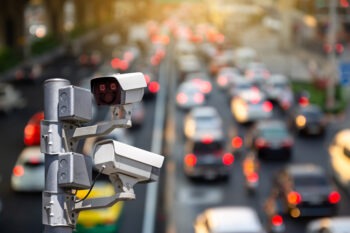
Getting traffic cam footage in Florida can be a necessary step in your case. Every accident tells a story, and evidence is crucial to unveil the truth. For those who have been through the distressing experience of an accident, gathering evidence can be an overwhelming task. One invaluable piece of the puzzle is traffic camera footage.
Typically, you can ask for traffic cam footage from the police department in the jurisdiction of your accident. However, you may need to follow some steps to be eligible. Whether you’re a victim, driver, or a concerned party, this evidence can impact the outcome of your case. That’s why our experienced Florida car accident lawyers answer the most asked questions about getting traffic cam footage in Florida.
What Is Traffic Camera Footage?
In today’s world, where cameras are everywhere, traffic camera footage has become a valuable piece of evidence, especially in the aftermath of an accident. An experienced personal injury lawyer in Tallahassee can use that footage to build a strong case for you.
Traffic camera footage is a visual record of events captured by cameras mounted at various locations, primarily at traffic intersections, along highways, and near pedestrian crossings. These cameras continuously record the surrounding traffic conditions.
Who Has Access to Traffic Cam Footage?
In Florida, access to this valuable visual data isn’t confined to a select few. It’s available to a range of individuals and entities, each with their specific reasons for needing this footage. Here’s a look at some of those parties:
- Law enforcement agencies, such as the Tallahassee Police Department
- Government agencies
- Nearby businesses
- Accident victims and their legal representatives
- Insurance companies
Access to traffic camera footage in Florida is a shared privilege, ensuring transparency and accountability on the road. However, it’s essential to navigate this process within the bounds of legal requirements and regulations.
What Are the Legal Requirements for Accessing the Footage?
Accessing traffic camera footage in Florida comes with a set of legal requirements and procedures. The purpose of these requirements is to ensure that the privacy and rights of individuals are respected. Among many other things, you need to have a valid reason to comply with Florida’s Public Records law and make a proper request.
By adhering to these legal requirements, you ensure that your request for traffic camera footage is both valid and respectful of privacy and confidentiality. Following these steps will help your legal team access the evidence you need.
Steps to Accessing Traffic Cam Footage in Florida
Step 1: Determine If You Have a Valid Reason for Needing the Footage
Accessing traffic camera footage in Florida begins with understanding the reason for your request. It’s essential to establish a valid and legally justifiable purpose for needing the footage. Valid reasons typically include:
- Accident Investigation
- Legal Claims
- Traffic Studies
- Public Safety
Ensure that your reason aligns with one of these categories, as it’s crucial to have a legitimate purpose for accessing the footage. For instance, your truck accident lawyer in Tallahassee may have a valid reason to request the footage after you had a truck accident.
Step 2: Contact the Appropriate Government Agency
Once you’ve established a valid reason for needing traffic camera footage, the next step is to determine which government agency manages the specific cameras involved in your incident. The responsible agency can vary depending on the cameras’ location.
- Local Police Departments
- Florida Department of Transportation (FDOT)
- Municipalities
- Other State or Federal Agencies
Ensure you identify the correct agency overseeing the cameras to direct your request accurately.
Step 3: Submit an Official Request for Traffic Cam Footage
After determining the managing agency, you’ll need to submit an official request for the traffic camera footage. This request should be made in writing, typically through an official form provided by the agency. It’s crucial to be precise in your request, specifying the following details:
- Date and time of the incident
- Location of the cameras that captured the incident
- The reason for requesting the footage
- Your contact information for correspondence
Step 4: Provide All Relevant Information and Documents
To expedite the process, ensure that you provide all relevant information and documents along with your request. That may include copies of accident reports, police reports, or legal case details if applicable. The more information you supply, the easier it will be for the agency to locate and provide the requested footage.
Step 5: Follow Up With the Government Agency Regarding Your Request
After submitting your request, it’s advisable to maintain regular communication with the government agency handling your request. Following up helps ensure that your request progresses and receives proper attention. Agencies may have specific procedures and timelines for handling requests, so staying in touch can help you receive the footage promptly.
Are There Fees Associated With Requesting Traffic Cam Footage?
Fees can vary depending on the government agency managing the traffic cameras and the purpose of your request. It’s advisable to inquire about any potential fees when submitting your official request for traffic camera footage.
Government agencies or third-party providers should be transparent about their fee structure, ensuring you are informed about the costs associated with accessing the footage. Additionally, if you are involved in a pedestrian accident, consult with your Tallahassee pedestrian accident lawyer to determine whether these fees are recoverable as part of your case expenses.
Getting Traffic Camera Footage in Florida – FAQs You Should Know
The aftermath of a traffic accident can be chaotic, leaving you with questions and concerns. Obtaining traffic camera footage can be a valuable step in understanding the situation, but the process may seem daunting. Here are answers to some frequently asked questions to help you navigate this process:
What if There Isn’t Traffic Camera Footage Available?
Don’t lose hope! Even if a traffic camera wasn’t present, there might be security camera footage from nearby businesses. Witness statements or dashcam footage from other drivers can also be crucial pieces of evidence. An experienced attorney can help you explore all available avenues to reconstruct the events.
Can Anyone Access Traffic Camera Footage?
Traffic camera footage is typically restricted for law enforcement and those with a legitimate reason, such as people involved in a traffic accident. Privacy laws may also limit access.
What Types of Traffic Cameras Are There?
There are different types of traffic cameras, including red-light cameras that capture violations at intersections, speed cameras that monitor vehicle speed, and general traffic monitoring cameras that provide broader views of traffic flow. The type of camera may determine the kind of footage available and its usefulness in your situation.
Is Traffic Camera Footage Considered Undeniable Evidence?
While traffic camera footage can be very compelling evidence, it’s important to remember that other factors, like poor weather conditions or malfunctioning equipment, could be considered during legal proceedings. An attorney can help ensure that all aspects are reviewed.
How Long Is Traffic Camera Footage Stored?
Retention periods for traffic camera footage vary depending on the agency that manages the camera. It’s important to act quickly to increase your chances of obtaining the footage.
What if the Accident Happened on Private Property?
Traffic camera footage typically wouldn’t be available in a private property accident. However, security cameras from nearby businesses might have captured relevant details. A Tallahassee premises liability lawyer can advise you on the best course of action.
Do I Need a Lawyer to Get Traffic Camera Footage?
No, you are not obligated to hire a lawyer to obtain traffic camera footage. However, an experienced car accident attorney can help you submit a formal request according to the specific agency’s guidelines and advise you on how to interpret the footage in the context of your situation.
What if the Footage Shows I Was Partially at Fault?
Florida follows a comparative negligence system, meaning fault is shared between parties involved in an accident. An attorney can help determine the percentage of fault attributed to you and fight for fair compensation based on the specific circumstances.
What Happens if the Agency Denies My Request?
If your request for traffic camera footage is denied, an attorney can advise you on your options, which might include appealing the decision.
Talk to an Experienced Car Accident Lawyer in Florida at No Cost
We understand that dealing with a car accident is stressful. If you’re considering obtaining traffic camera footage or need guidance navigating a personal injury claim, consider talking to a qualified car accident attorney in Florida. Many offer free consultations to discuss your situation and explore your legal options.
Who Can Answer My Legal Questions About Footage for My Case?
If you have legal questions about the footage or its relevance to your case, consider consulting an experienced attorney. They can provide guidance and ensure you use the footage effectively for your legal claim. Properly handled footage can serve as a critical piece of evidence in your accident claim or legal case.
If you’ve been involved in an accident and need legal advice or assistance, don’t hesitate to contact our experienced team at Fasig | Brooks. We’re here to help you navigate the complexities of your case and secure the compensation you deserve.



